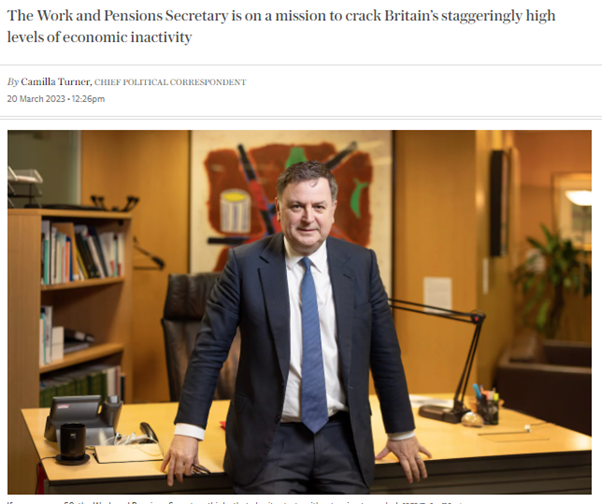The best 11 ways to retain your 50+ employees
21 March 2023 By Victoria Tomlinson

The 50+ generation has never been so popular. This weekend Mel Stride, the Work and Pensions Secretary, said that for this generation to go back to work was so vital to the economy it should be seen in the same light as charity work and giving back.
I have to say, it felt a patronising comment. So many want nothing better than to work. But the workplace is no longer working for them. This generation have been leaving in droves and when they try and find another job, recruiters admit they want younger people (see this research from the Chartered Management Institute)
However I am heartened. We are working with progressive employers who are re-thinking ‘work’ so it can be part-time and flexible. They also realise they have few benefits for experienced generations. They tend to offer a lot around childcare and even fertility help, but one said ‘We only have impotency and menopause support for older employees’. We are realising the biggest benefit at this stage is to offer pre-retirement help, especially around ideas as to what they can do next – and giving them the skills and confidence to do this when they unretire.”
We started Next-Up to help people understand the impact of retirement and come up with ideas and a plan for their unretirement – they do this through workshops and an online platform, Rethink Retirement. And interestingly, by getting people to think and talk openly about what they want long term, many realise they would be happy to stay on longer – if they could work flexibly. Our platform encourages employees to talk to their line managers and discuss flexible options – a subject they find difficult to raise without hitting age discrimination. We also help employees to think about what they could do before leaving – such as getting involved with their organisation’s ESG initiatives (sustainability, diverse recruitment, #MeToo and the rest). This can reinvigorate people in their current jobs and give them and their employer skills for the future.
So what can employers do to retain this generation at work? This is our eleven-point action plan if you want to recruit and retain experience in your workforce
- Flexibility: Research by the Centre for Ageing Better highlighted that many of this generation are caring for grandchildren as well as elderly parents; they don’t want ‘presenteeism’ and want to focus on outcomes rather than hours worked. Flexible working is better suited to the 50+ generation as well as those excluded from work, such as those with disabilities.
- ED & I: Include age as one of your pillars of diversity and measure employee engagement by age to understand how to address their issues.
- Training: Set up focus groups to understand what training is needed and wanted by employees over 50 and see your employees re-energise.
- Benefits: What are you offering the experienced generation? Consider how financial planning and pre-retirement support could help employees decide what to do next and start a plan for when they leave full-time careers. It will also encourage them to initiate discussions about working flexibly for longer, rather than retire sooner.
- Combat ageism: Employers across the country admit that ageism is rife – but equally, prejudices exist against younger employees. Focus on creating mixed-generation teams; get them talking about their biases and discuss how to change attitudes.
- Mentoring programmes: How well are you using the skills of your experienced employees? Mentoring others in the business ensures knowledge and experience is passed down and encourages a new sense of purpose.
- ESG initiatives: Get the older generations involved in your corporate initiatives – from sustainability plans to achieving better gender balance. The 50+ generation tends to be good at building relationships – utilise these skills and in the process, they will be re-energised and could build new skills, contacts and expertise for when they retire.
- Advertising: How diverse is your job advertising imagery – is everyone younger than 50? Make sure your ads feel relevant to every demographic.
- Recruitment: Words such as ‘innovative’, ‘adaptable’ and ‘tech-savvy’ are off-putting for older employees. Emphasise how much you value experience – words such as ‘knowledgeable’ and ‘dependable’ are likely to increase how well older applicants think they will fit in.
- Retainment: Make sure employees know that they can work flexibly, particularly if they are thinking of retiring or leaving, tell them you would like to find ways for them to stay working, alongside their other commitments/interests/side hustles
- Value over time: Many of the 50+ generation have had enough of managing people but want to do good quality, challenging work and are still ambitious. Project-based, flexible tasks based on outcomes serve everyone better.
Despite the current media headlines, this generation is not lazing around. We are working with thousands of this age, and they are starting businesses, becoming consultants, helping local schools and charities and angel investing. Employers really need to focus on appealing offers for the 50+ if they are to attract them back. They are contributing to the economy but not in ways that are immediately obvious to the statisticians.


